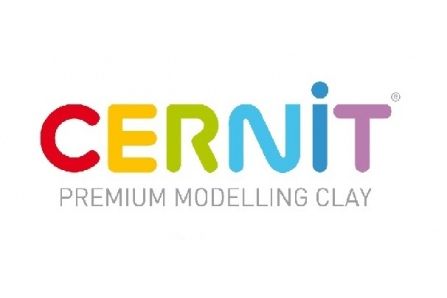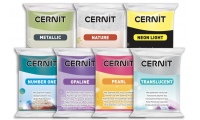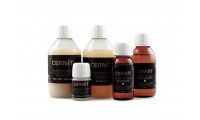Catégories du blog

Subcategories
-
Cernit is a modelling polymer clay that contains PVC and plasticizer. Polymerising happens during baking. The clay hardens.
Polymer clay can be used from 8 years. It is liked for making decorative items such as jewellery (earrings, bracelets, pendants...), figurines, accessories, miniature food or even for customisation and restoration of furnitures.
Children as well as adults or professionnal artisans or jewellery makers use this polymer clay.
The large colour range allows begins and more experienced users to vary shades without having to mix colours.
Our range holds many different shades and effets :
-
Cernit Number one : 42 opaque colours, glossy after polishing. Available in 56 g, 250 g or 500 g.
-
Cernit Opaline : 14 colours with a porcelain-like finish. Available in 56 g, 250 g or 500 g.
-
Cernit Glamour : 7 pearlescent colours in pieces of 56 g.
-
Cernit Metallic : 14 metallic colours in pieces of 56 g.
-
Cernit Translucent : 13 transparent colours and 1 night glowing colour. This range is very popular among the artists due to its amazing transparency. Available in 56 g, 250 g ou 500 g.
-
Cernit Neon : The most neon of all polymer clays, 4 colours available in 56 g !
-
Cernit Nature : 3 colours with a stone and dirt effect thanks to strands in the clay that allows an irregular aspect, similar to the one of a stone. Available in pieces of 56 g.
-
Cernit Shiny : 7 colours in 56 g, highly concentrated in coloured mica that contrast with the colours of the clay. The shiny is different from the glamour due to the thinness of the glitter in it and the colours effects. These colours are perfect for jewellery as they have a pretty metallic effect together with coloured hints.
-
Cernit Doll : 8 colours that have a skin-like effect (slightly transparent) and one translucent flesh colour. This clay has an aspect very close to flesh, a porcelain-like finish and is totally suitable for creating dolls. Each piece weighs 500g.
-
Cernit Soft Mix : a clay softener that does no change the colour of the clay. You can mix up to a third of softener with 2/3rd of polymer clay Cernit. This way, the clay will be easier to work with and softer. The plasticity of the clay is increased.
How to use polymer clay Cernit ?
Once unpacked, the clay has to be kneaded in the palm of the hand before starting modelling so that it goes softer and easier to work with. The clay should be used with clean hands on a clean surface as well to prevent any dirt or dust to get in the clay.
There are as many uses as one could imagine ! Cernit can be moulded, sculpted, with or without tools, printed or mixed with stones, beads, feathers, powders, paints....
How to bake polymer clay Cernit ?
The Cernit clay polymerises between 110 and 130°C (230-266°F) in a preheated oven. Baking time is of 30 minutes. Temperature should be respected unless harmful gases could develop and the colour could be corrupted.
Be careful, this clay cannot be baked in a microwave oven! After baking, the clay is waterproof. Also, it can be baked several times if you wish to add bits to your work.
When you are done baking, the clay can still be worked with. It can be sanded, drilled, varnished according to the finish you like. For polishing, start with sanding gently the clay with a fine-grain sandpaper. Finish with a polisher to get a maximum glossy effect. After some time, if it rubs clothing the clay could loose some of the glossy. Then, it has to be polished again. The result will be the same as with varnish. However, varnish will resist the rubbing and does not need to be applied again.
As soon as your piece of clay is baked and maybe polished, you can still work on it by adding acrylic paints, oil paints, mica powders or varnish.
How to store polymer clay Cernit ?
Once the packaging is open, Cernit can be stored in that same package or in a plastic wrap, to the ambient temperature. You can keep it like that up to 3 months.
Safety
Our Cernit does not contain any phtalates. Children should not be left without a watch while using the clay. This product must not be put in the mouth and we advise to wash hands after each use.
One should not eat, dring or smoke in an area which is dedicted to modelling Cernit.
The cernit clay is produced in our factory in Wandre, Belgium.
If you require further information on this product, please do not hesitate to contact our team to the following phone number : +32 4 362 19 90 or via e-mail : info@clay-and-paint.com
-
-
Thanks to the many Cernit accessories, create many objects, jewels, accessories in polymer clay!
Structure plates, silicone moulds, modelling tools, jewellery parts... Many possibilities open up to you ! Create decorative elements with silicone moulds, stylish jewelery with texture plates, or use tools to shape your doll or figurine sculptures.
Jewelery parts allow you to create matching trimmings. Pendants, earrings, key chains or brooches ... Let your imagination speak!
The novices, as well as the more experienced users, will appreciate the ball tools to create relief, the blades to cut sharply, the textured plates to create a variety of effects! Among the essentials to get to start the polymer, you will find the blades, the stainless steel roller and textured plates that will quickly become your allies for the creation of jewelry or for printing other Cernit pieces.
Divert their uses for more creation! -
Do not settle for simple polymer clay: add extra touches with Cernit auxiliaries!
Varnish, mica powder or Magic Mix plasticizer are so many ways that you can use to enhance your achievements.
Start by selecting the mica powders that interest you. Depending on the usage, you will have the choice between metallic colours, interferences, diamonds or duos (which change of colour according to the light). To add a touch of shine by mixing with the clay or a surface by spreading it with the finger, the sparklings are perfect!
Create light effects on your jewels: necklaces, pearls, pendants, cabochons ...
Among our varnishes, make your choice between large packaging (250 ml) or small (30 ml) and between the matte and shiny finish.
Cernit's Magic Mix plasticizer is a revolutionary way to bring to life your polymer clay that has become too firm. Thanks to the applicator bottle, easily dose a few drops of products and mix little by little until you get the desired consistency: rejuvenated but relatively firm, flexible clay, chewing gum clay or coulis!
Use it also to smooth fingerprints or imperfections of the clay. In a nutshell, the Magic Mix is THE product without which you will not know how to work!
The polymer clay Cernit was born in the sixties, in Prague, in Czech Republic. A couple of scientifics creates this clay that will be named according to the first name of the lady which was called Cerna.
Forced to emigrate in Germany in 1963, they both decide to publish a newspaper ad to find
an investor who would help them develop the product.
Soon, Mr Manfred Guder notice the ad and decides to collaborate with the inventors. When they decide to retire, Mr Guder hire a chemist in charge of the development of the clay colour range. At that time, production takes place in the Frankfurt factory in Germany.
Over the years, the sales are running out and Cernit is only sold to 2 clients who represent together 50% of the turnover.
From 2000, Mr Guder collaborate with the company Bodson-Nélis, manufacturer of the Darwi air-drying clay. He will be distributing the clays Darwi Classic, Darwi Roc, Darwi Extra-light, to the Cernit brand.
Only 7 years later, Cernit is offered for sale, having as potential buyers Fimo, Sculpey and the belgian company, who had turned into “Darwi”. The next year, Cernit becomes officially belgian when it is taken over by Darwi.
Ever since, the Cernit range has been extended with various accessories for modelling, creating jewellery, dolls, flowers, etc. New colours and new developments are still coming... Do not miss them!
The Clay & Paint Factory | VAT 0668.484.210 | Legal Notice & Contact
General Conditions
This internet site uses cookies to improve the users experience. Terms of use of website and protection of personal data.
© Copyright 2025 - E-net Business, creator of e-commerce websites for businesses, self-employed, & SMB
 Cernit tutorials
Cernit tutorials


